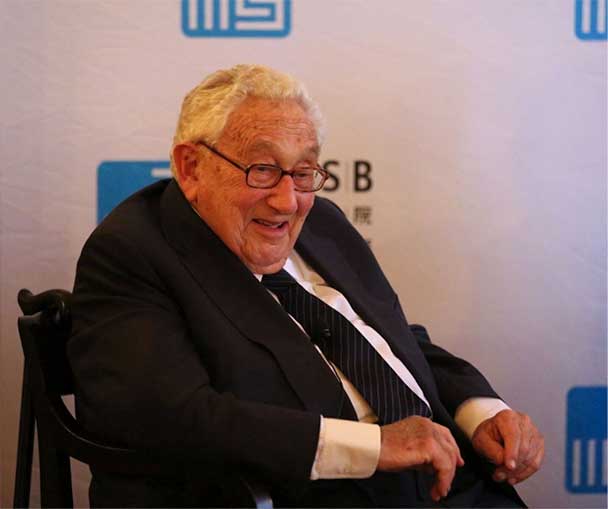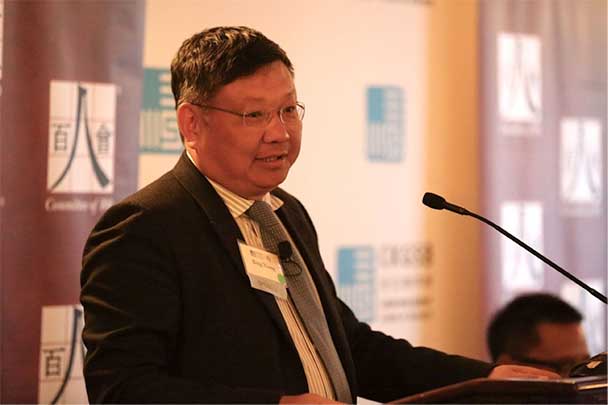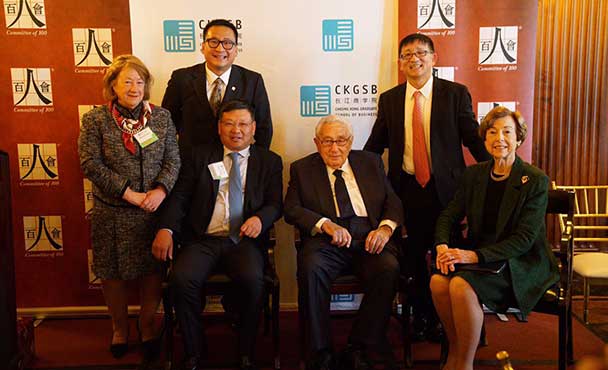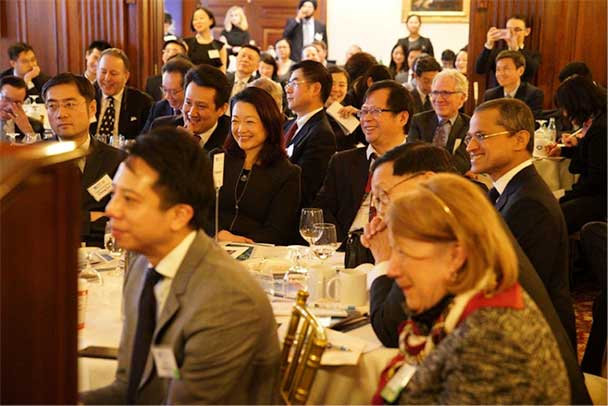Former US Secretary of State features at CKGSB Knowledge Series Event in New York just days after meeting Chinese President in Beijing
New York, NY—The Cheung Kong Graduate School of Business, China’s leading business school, hosted a special edition of its Knowledge Series events in New York City this week, featuring an impressive line-up of speakers, including former US Secretary of State Henry Kissinger. In the context of the ongoing US presidential transition and Kissinger’s recent meeting with China’s President Xi Jinping, CKGSB’s event served as a timely and pertinent platform to shed light on this critical moment in history.
The world renowned diplomat, who laid much of the groundwork for President Nixon’s historic visit to China in 1972, offered his views on the state of US-China relations, which are at something of a crossroads amid uncertainties over US President-elect Donald Trump’s China policy. Kissinger, who has briefed the incoming President on China policy, struck an optimistic note on the future of this important bilateral relationship. He argued that the sometimes tough rhetoric that candidate Trump used during the campaign was likely just talk aimed at “satisfying domestic constituencies”.
President-elect Trump has yet to take office, Kissinger pointed out, arguing that “in the beginning of an administration, it’s possible that many different points of view are expressed.” Dr. Kissinger said he believes, however, that when President-elect Trump does take office and thoroughly examines US national interests with respect to China, that “the cooperative way will prevail”. “If China and America are in conflict,” he said, “the whole world will be divided.”

Dr. Henry Kissinger at CKGSB’s Special Knowledge Series event
Kissinger also broached the subject of the One-China policy, just days after President-elect Trump questioned US commitment to it on national television. “I was a participant in the establishment of that policy,” he said, referring to his secret diplomacy with Premier Zhou Enlai, which set the stage for Nixon’s visit and the subsequent Shanghai Communiqué that stressed both countries commitment to a unified China. “[China-policy] has been conducted the same way for eight administrations over 50 years,” he continued, arguing that the American embrace of the rise of China, and the importance of the US recognizing the validity of Beijing’s One-China policy, have been two of the truly bipartisan policy stances to stand the test of time.
Echoing Kissinger’s confidence, CKGSB Founding Dean and Professor of China Business and Globalization, Xiang Bing, emphasized the opportunities and responsibilities that lie ahead for the US and China. “There are ongoing disruptions in economic development models, technology, social changes, global trade and investment systems, global governance, geopolitics, as well as climate change and sustainable development,” said Dean Xiang. “As a result of these transformations, this may be the best of times or the worst of times. China and the US have a joint responsibility to make it the best of times for humanity.”

CKGSB Founding Dean Xiang Bing delivering keynote remarks at the event
Dean Xiang also stressed the idea that both the US and China face similar challenges—such as combating income inequality and supporting the middle class—and that these complimentary challenges can be addressed through bilateral collaboration.
Dr. Xiang used the example of the iPhone to illustrate his point. While Apple employs many Chinese workers in the construction of the phone, China’s economy captures less than 2%, or $5, of the final sales value. Workers and investors in the US, meanwhile, capture close to 60% of the final sales price tag through high-value tasks like product design.
China’s challenge is to create Apple-like innovation at home, so that it can also benefit from these high-value processes, while the US’s challenge is to find a way to spread the wealth of its already innovative economy more evenly among its citizens. But neither goal, Dr. Xiang said, will be achieved through trade barriers, which will only prevent the flow of ideas and hinder necessary collaboration.
In the final analysis, both Kissinger and Xiang were very optimistic about the future of the US-China bilateral relationship because both nations have so much to gain by working together. “I believe there is an unusual opportunity for synchronizing the actions of the two countries,” Kissinger said, “primarily because it is so clearly in their national interests.”

Seated from Left to Right: Bing Xiang, Founding Dean of CKGSB; Dr. Henry Kissinger, Former US Secretary of State; Ambassador Carla Hills, Chairman and CEO of Hills & Company;
Joining Dr. Kissinger and Dean Xiang at this unique CKGSB event were a line-up of other distinguished speakers, including Cheng Li, Director of Brookings Thornton China Center; Ambassador Carla Hills, Chairman and CEO of Hills & Company; Frank Wu, Chairman of the Committee of 100; and Mary Darby, Chief Representative of CKGSB Americas. These opinion leaders drew on their historical experiences and personal anecdotes to shed light on this critical moment in US-China relations.
CKGSB’s event, which convened over 150 American and Chinese government, business and opinion leaders, as well as global media, was particularly timely. Earlier this month, Dr. Kissinger met with President Xi Jinping to discuss US-China relations. During the visit, President Xi expressed his hope for relations to “move ahead in a sustainable and stable manner” during this time of transition. On this, Kissinger confirmed his confidence in future relations between the two countries.

US and Chinese leaders from both the public and private sectors attended this special event
As a global business school from China, CKGSB aims to foster dialogue on important issues, such as US-China relations, by convening thought leaders from the East and West to share their experiences and insights for a better mutual understanding. The school will continue to do so by partnering with influential institutions in the field, such as the Committee of 100, to bring in different perspectives and connect networks.